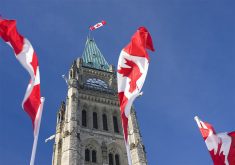A new era of international trade is beginning as U.S. president Donald Trump prepares to launch trade wars, including with Canada.
This isn’t something we should take personally. We are being drawn into a dispute that is not of our making. Nor is it an isolated event.
Canada followed in good faith the U.S.-Mexico-Canada Agreement that Trump negotiated the last time he was in office, and we have been a good partner and friend to the U.S. throughout our history as neigbours.
Read Also

Growth plates are instrumental in shaping a horse’s life
Young horse training plans and workloads must match their skeletal development. Failing to plan around growth plates can create lifelong physical problems.
True, we have not met our commitment to NATO allies of spending two per cent of gross domestic product on defence, which is a legitimate concern flagged by the United States.
But Trump’s attack on Canada is part of his larger goal of undermining the rules-based international order that the U.S. designed and enforced since the Second World War. Instead of reacting rashly, it’s important we pause to understand the unfolding sea change in international trade.
Firstly, we must resist the tendency to view this attack through a partisan lens. Trump doesn’t, as illustrated by his statements that he doesn’t care what Conservative leader Pierre Poilievre thinks.
We also shouldn’t fall for the president’s pretenses for the impending tariffs, which is the allegation that migrants and fentanyl shipments are pouring into the U.S. from Canada. These complaints are unfounded. To react to everything he says is a fool’s game.
We should still take action to secure the Canada-U.S. border, but because it is in our own best interests and not because the U.S. demands it.
Trump has worked to compromise the separation of the legislative, executive and judicial branches of the U.S. federal government that is set out in the country’s constitution. For the foreseeable future, there will be constitutional crises piled onto constitutional crises, and it is already difficult to argue that the rule of law still reigns south of the border.
The destruction of the institutions that have made the U.S. the most powerful country in history is well underway, and the social implications for both the U.S. and Canada will be profound. This is even more reason to ensure our border security is strong.
To help soften the blow from the imposition of tariffs on Canadian goods brought into the U.S., industry analysts and politicians agree that trade barriers between provinces should be taken down.
A 2019 paper by the International Monetary Fund estimates that complete liberalization of internal trade in goods can increase Canada’s GDP per capita by about four per cent.
At first glance, removing interprovincial trade barriers appears to be a low-hanging fruit to help shore up Canada against U.S. expansionist rumbling and the backslide toward protectionist policies internationally. Miles of red tape are embedded in the technical, regulatory and administrative barriers to trade within Canada that have little benefit to Canadians. Harmonizing these barriers, including with trucking regulations, has little downside.
More difficult politically will be addressing some prohibitive barriers to interprovincial trade, such as alcohol sales, because each province has something it wants to protect from being undercut by production in other provinces.
There will be some losers, as there always are when trade is liberalized, but there will also be many benefits to Canadians, including lower costs to consumers and support for domestic production.
Canada’s industrial policies will need to be drastically changed in response to our newly hostile southern neighbour, and this is one of those moments where we should not waste a good crisis. We need to look for the opportunities and seize them.
As a G7 country with vast resources that the world needs, including a world-class agri-food industry, we can make Canada the most attractive place for trade and investment in the world — if we stick together.
Karen Briere, Bruce Dyck, Robin Booker, Paul Yanko and Laura Rance collaborate in the writing of Western Producer editorials.















